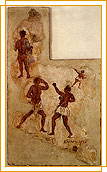Changes in the athletic spirit
The expansion of the Hellenistic culture and the new economic, political
and social conditions  that were shaped after the campaign of Alexander
the Great, caused important changes in the athletic spirit and the
ideological content of the games. that were shaped after the campaign of Alexander
the Great, caused important changes in the athletic spirit and the
ideological content of the games.
The number of athletic events and institutions increased at Hellenistic centres. New competitions were established in various city-states of the Hellenistic world, such as the Ptolemaea in Alexandria, the Nicephoria at Pergamum and the Heracleia at Chalcis. The number of professional athletes from Alexandria and the East increased and monetary prizes became something common.
Athletics became an important element of the social life and education. The Greeks living in Anatolia and Egypt, in their effort to maintain their culture, built athletic facilities and preserved their athletic traditions. The gymnasium was not only a place where Greeks used to exercise but also a place where the Greek language and customs remained alive.
 The bond between religion and the athletic ideal ceased to exist and the games developed into secular events. Victory was related more with the athlete's personal efforts and less with the help from the gods. The bond between religion and the athletic ideal ceased to exist and the games developed into secular events. Victory was related more with the athlete's personal efforts and less with the help from the gods.
During the Roman period the athletic ideal changed once again. For the Romans the games were a spectacle, performances (ludi) and not a competition among all the citizens. Usually the athletes were slaves or gladiators. The Romans of the upper class were unwilling to display themselves in public, something that reveals a negative attitude towards athletics. Olympia was no longer the centre of the ancient world and the Games as an institution were used from that time onwards to honor the Roman emperor.
|
